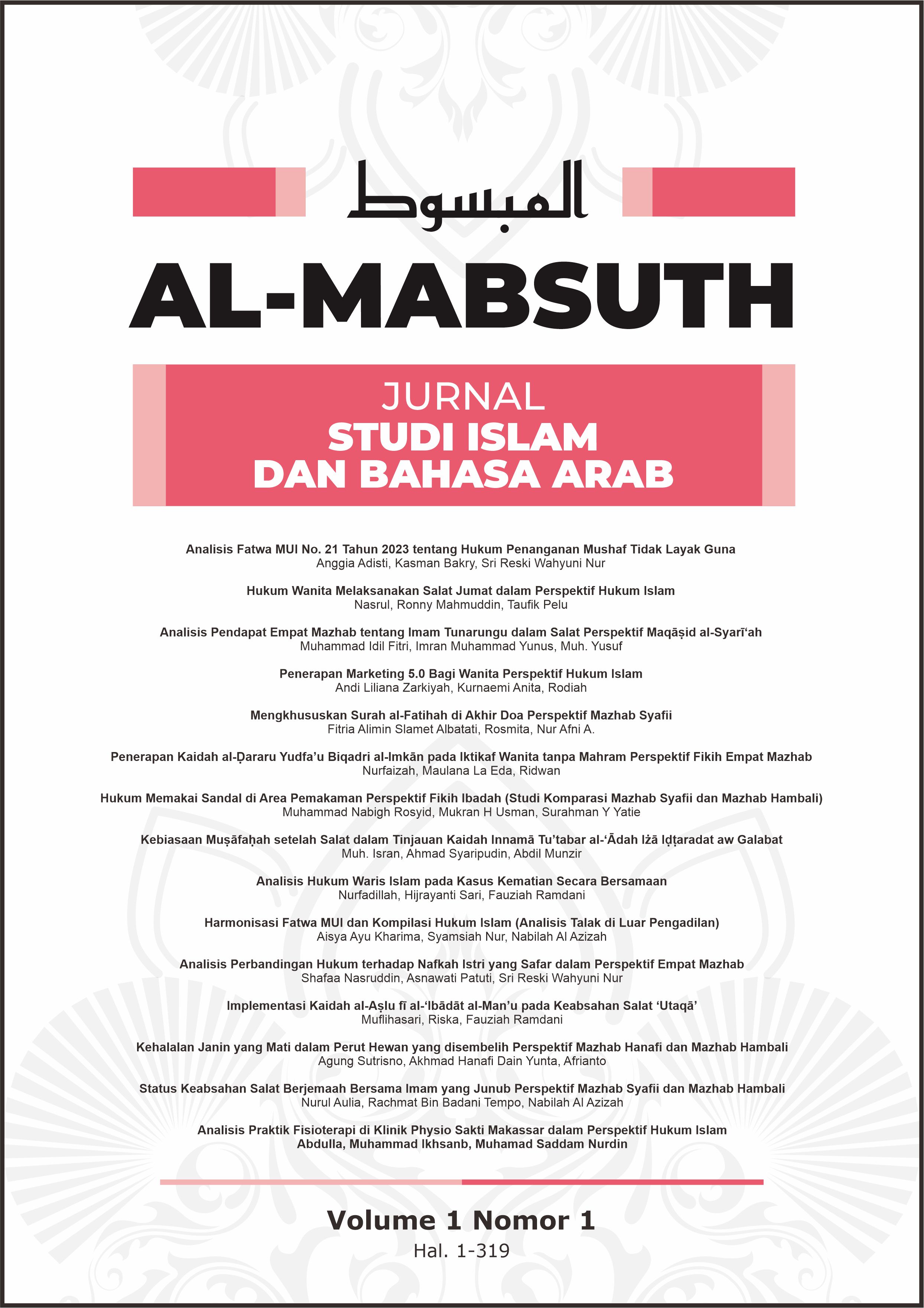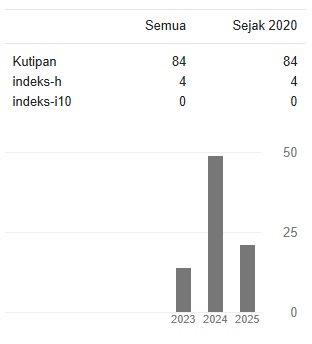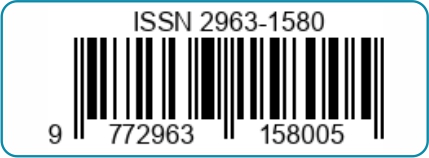Penerapan Kaidah al-Ḍararu Yudfa’u Biqadri al-Imkān pada Iktikaf Wanita tanpa Mahram Perspektif Fikih Empat Mazhab
The Application of the Principle of al-Ḍararu Yudfa’u Biqadri al-Imkān on Iktikaf for Women without Mahram from the Perspective of the Four Schools of Fiqh
DOI:
https://doi.org/10.36701/mabsuth.v1i1.2411Keywords:
Iktikaf, Fiqh rules, Mahram, MazhabAbstract
This study aims to examine and understand the concept of the principle of al-Ḍararu Yudfa'u Biqadri Al-Imkān as a legal basis for the implementation of iktikaf for women without a mahram, reviewed from the perspective of the four schools of fiqh. The focus of this study is on efforts to prevent harm (ḍarar) that may arise in the practice of iktikaf worship, particularly regarding safety and interaction between men and women within the mosque. The methodology employed is a qualitative approach through library research, as well as normative and comparative approaches. The data sources used are primary and secondary sources obtained from classical fiqh books and other relevant scientific literature. The results of this study indicate that the majority of scholars from the four schools of thought permit women to perform iktikaf in the mosque under certain conditions, particularly regarding safety and the separation of spaces between men and women. In conditions where the mosque is unsafe or lacks separation facilities, the potential for fitnah (temptation) and violations of the purpose of i'tikaf becomes high. Therefore, the application of the principle of al-Ḍararu Yudfa’u Biqadri al-Imkān (harm must be avoided to the extent possible) affirms that prohibiting or restricting women's i'tikaf without a mahram in vulnerable places is a preventive measure in accordance with the principles of sharia. The implications of this research encourage mosque administrators to prioritise the comfort and safety of female worshippers, as well as provide comprehensive legal education on the implementation of iktikaf to ensure it remains consistent with the objectives of worship and the values of public welfare.
Downloads
References
Al-Qur’ān al-Karīm
Buku:
Ālu Burnū, Muḥammad Sidqī ibn Aḥmad ibn Muḥammad. Al-Wajīz fī Īḍāḥi al-Qawāid al-Fiqhiyyah. Cet. VI. Damaskus: al-Risālah al-‘Ilmiyyah, 1436 H/2015 M.
Ālu Burnū, Al-Wajīz fī Iḍāhi Qawā’id al-Fiqh al-Kulliyyah. Cet. V. Beirut: Muassasah Ar-Risālah, 1422 H/2002 M.
Al-Amīn, Muḥammad. Ḥāsyiah Radd al-Muḥtār. Cet. II. Mesir: Matba’ah Mustafa, 1386 H/1977 M.
Al-‘Asqalānī, Aḥmad ibn ‘Alī ibn Ḥajar. Fatḥ al-Bārī. Mesir: al-Maktabah al-Salafiyah, 1380–1390 H/1961–1971 M.
Al-Bukhārī, Abū ‘Abdullah Muḥammad ibn Ismāīl. Ṣaḥīḥ al-Bukhārī. Cet. V. Damaskus: Dar ibn al-Katsir, 1414 H/1993 M.
Al-Gazālī, Abū Ḥāmid Muḥammad ibn Muḥammad. Al-Mustaṣfa. Cet. I. Beirut: Dār al-Kutub al-‘Ilmiyyah, 1413 H/1993 M.
Ḥanbal, Aḥmad ibn. Musnad al-Imām Aḥmad ibn Ḥanbal. Cet. I. t.t.: Muassasah al-Risalah, 1421 H/2001 M.
Ibn Qudāmah, Muwafaquddīn Abū Muḥammad ‘Abdullah ibn Aḥmad ibn Muḥammad. Al-Mugnī. Cet. III. Riyāḍ: Dār ‘Ālim al-Kutub, 1417 H/1997 M.
Ibn Rusyd, Abū al-Walīd Muḥammad ibn Aḥmad. Bidāyah al-Mujtahid wa Nihāyah al-Muqtaṣid. Kairo: Dār al-Ḥadīṡ, 1425 H/2004 M.
Al-Ifrīqī, Muḥammad ibn Mukram ibn ‘Alī al-Ifrīqī, Lisān al-‘Arab. Cet. III; Beirut: Dar Sadir, 1414 H/ 1994 M.
Al-Kāsānī, ‘Alāuddīn Abū Bakr ibn Mas’ūd. Badā’i‘ al-Ṣanā’i‘ fī Tartīb al-Syarā’i‘. Cet. I. Mesir: Matba’ah Syarikah al-Matbu’at al-‘Ilmiyyah, t.th.
Al-Lugawiyyīn, Nukhbah Min. Al-Mu’Jam al-Wasīṭ. Cet. II; Qahirah: Mu’jam al-Lugah al-‘Arabiyyah, 1392 H/ 1972 M.
Mālik, Mālik ibn Anas. Al-Mudawwanah. Cet. I. t.t.: Dār al-Kutub al-‘Ilmiyyah, 1425 H/1994 M.
Al-Maqdisī, Mujīruddīn ibn Muḥammad al-‘Alīmī. Fatḥurraḥmān fī Tafsīr al-Qur’ān. Cet. I. t.t.: Dār al-Mawādir, 1430 H/2009 M.
Al-Maqdisī, Syamsuddīn Abū al-Faraj Abdurrḥmān ibn Qudāmah. Al-Syarḥ al-Kabīr ‘ala Matn al-Muqni’. Beirut: Dar al-Kutub al-‘Arabī, 1403 H/1983 M.
Nazir, Mohammad. Metode Penelitian. Jakarta: Ghalia Indonesia, 2014.
Al-Naisābūrī, Abū al-Ḥusain Muslim ibn al-Ḥajjāj. Ṣaḥīḥ Muslim. Kairo: Matba’ah ‘Isa al-Bab al-Halabi, 1374 H/1955 M.
Al-Nawawī, Abū Zakariyyā Muḥyiddīn ibn Syaraf. Al-Majmū’ Syarḥ al-Muhażżab. Kairo: Idārah al-Ṭibā‘ah al-Munīriyyah, 1344–1347 H/1926–1929 M.
Sugiyono. Metode Penelitian Kuantitatif, Kualitatif, dan R&D. Bandung: Alfabeta, 2016.
Al-Ṣābūnī, Muḥammad ‘Alī. Rawā’i‘ al-Bayān Tafsīr al-Āyāt al-Aḥkām. Cet. III. Damaskus: Maktabah al-Gazali, 1400 H/1980 M.
Al-Sa‘dī, ‘Abdurraḥmān ibn Nāṣir. Taisīr al-Karīm al-Raḥmān fī Tafsīr Kalām al-Manān. Cet. I. t.t.: Muassasah al-Risalah, 1460 H/2000 M.
Al-Ṣan‘ānī, Muḥammad ibn Ismā‘īl. Subul al-Salām Syarḥ Bulūgh al-Marām. Cet. III. Saudi: Dār ibn Jauzī, 1433 H/2012 M.
Al-Sarkhasī, Muḥammad ibn Aḥmad. Al-Mabsūṭ. Mesir: Maṭba’ah al-Sa‘ādah, t.th.
Al-Suyūṭī, Jalāluddīn ‘Abdurraḥmān. Al-Asybāh wa al-Naẓāir. Cet. I. t.t.: Dār al-Kutub al-‘Ilmiyyah, 1403 H/1983 M.
Al-Tafsīr, Nakhbah Min Asātiẓah. Al-Tafsīr al-Muyassar. Cet. II. Saudi: Mujma‘ al-Malik Fahd, 1430 H/2009 M.
Al-Tirmiẓī,Abū ‘Īsa Muḥammad. al-Jāmi’ al-Kabīr. Cet. I; tt: Dar al-Risalah al-Alamiyyah, 1430 H/ 2009 M.
Al-Qurṭubī, Abū ‘Abdullah Muḥammad ibn Aḥmad al-Anṣārī. Al-Jāmi’ li Aḥkām al-Qur’ān. Cet. III. Kairo: Dār al-Kutub al-Miṣriyyah, 1384 H/1964 M.
Jurnal Ilmiah:
Aswan, H. “Studi Islam dengan Pendekatan Normatif”. Tarbiyah Islamiyah: Jurnal Ilmiah Pendidikan Agama Islam 3. 1 (2013): h. 2.
Firli, Dania. “Studi Fikih dengan Pendekatan Comparative”. Fihros: Jurnal Sejarah dan Budaya 6.1 (2022): h. 41.
Idris, Abdul Fattah Idris. “Manhaj Ibn Rusyd fī Tarjīh min Khilāl Bidāyah al-Mujtahid.” Majallah al-Buhuṡ wa al-Dirāsah al-Syar’iyyah 92, no. 2 (1441 H): 79–130.
Munawir, M. Fajrul. “Reinterpretasi Pemaknaan Hadis tentang Iktikaf Wanita.” Musawa: Jurnal Studi Gender dan Islam 10, no. 1 (2011): 34–61.
Sa’dianti, Siti, et al. “Penggunaan Musala sebagai Tempat Iktikaf Wanita (Studi pada Asrama Putri STIBA Makassar).” Al-Qiblah: Studi Hukum Islam dan Bahasa Arab 1, no. 2 (2022): 222–228.
Skripsi:
Amanullah, Faiz. “Iktikaf di Masjid dalam Al-Qur’an.” Skripsi, UIN SMH Banten, 2020.
Erlina, Enong. “Ḥukm I‘tikāf al-Mar’ah ‘inda al-Imām Mālik wa al-Imām al-Syāfi‘ī.” Tesis, Universitas Darussalam Gontor, 2009.
MD Kari, Mohammad Syahmi Izzat bin Che. “Hukum Wanita Melakukan Iktikaf di Rumahnya (Studi Komparatif antara Imam Abū Ḥanīfah dan Imam Mālik).” Skripsi, UIN SUSKA Riau, 2023.
Situs Online:
Indonesia, Majelis Ulama. “3 Peristiwa Penting Bersejarah yang Terjadi pada Ramadan”, Situs Resmi MUI. https://mui.or.id/baca/mui/3-peristiwa-penting-bersejarah-yang-teradi-pada-ramadhan?utm_source=chatgpt.com (02 Juli 2025).
Downloads
Published
Issue
Section
License
Copyright (c) 2025 Nurfaizah, Maulana La Eda, Ridwan

This work is licensed under a Creative Commons Attribution-NonCommercial-ShareAlike 4.0 International License.










